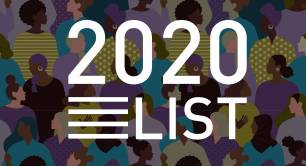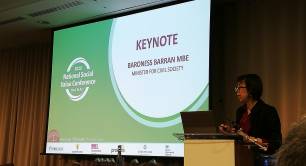‘I love the idea of the difficult woman’ - UK social enterprise minister talks personality and policy in exclusive interview
Women social entrepreneurs should continue being rebellious, according to the UK’s minister for civil society, speaking to a group of leading women as part of yesterday’s WISE Up 2020 webinar. Baroness Barran also urged them to make use of procurement opportunities and new funding to hire young employees – and said social enterprises could bring the ‘humanity’ to the government’s ‘levelling up’ agenda.
“I can’t think of a better environment to be in, frankly,” said Baroness Barran, when she joined yesterday’s WISE Up 2020 webinar, along with some 80 attendees from across the social enterprise space.
The minister for civil society and DCMS Diana Barran was taking a few minutes’ break from her lawmaker’s duties – including voting remotely in the House of Lords – for an exclusive conversation with the WISE (women in social enterprise) network, an initiative of Pioneers Post in partnership with NatWest.
“A ‘Zoom-ful' of women social entrepreneurs, it’s the best kind of group I can imagine,” she said.
Barran was appointed to her role in July 2019, following a career in banking and hedge fund management. She also founded the domestic abuse charity SafeLives, running it for 13 years.
Her current responsibilities include civil society (a brief that covers social enterprises), youth and social action, the government’s inclusivity unit and loneliness.
During yesterday’s conversation, chaired by Pioneers Post global editor Julie Pybus, the Baroness signalled strong support for the kind of leadership that doesn't always toe the line.
It is really important to surround yourself with other difficult women, but who complement your skillset
Responding to a question from WISE 2020 nominee Haleh Moravej on the advice she would give to “rebellious, difficult, change-making women”, she said: “I love the idea of the ‘difficult woman’, most of my best friends are difficult women.” Her advice to all the women entrepreneurs in attendance was, however, not to try it alone.
“I think if you are that difficult woman, with a strong vision, it is really important to surround yourself with other difficult women, but [ones] who complement your skillset.”
This was something she learned when starting a charity, she added: “One of the things that I brought to it was a kind of analytical mindset that came from my City days, but I had the emotional intelligence of a kind of small snail.” This led her to seek out complementary personalities in her team.
Praise for ‘pirouetting’
Barran acknowledged the loss in trading income faced by social enterprises during the Covid-19 crisis, and said her mission was to support them to reopen as quickly as possible. Social enterprises brought out “the best in our communities, in terms of generosity, offers for help, volunteering and all sorts of agility and pirouetting to reshape businesses and activities,” she said.
The diversity of the social enterprise movement also resonated with growing public awareness of inequalities that had been “cruelly” laid bare by Covid-19. “I think we should be incredibly proud of the number of women leaders, the number of leaders from Black, Asian and other minority ethnic communities, and indeed leaders with disabilities,” the minister added.
Asked what the government was doing to help social enterprises during this crisis and beyond, the minister highlighted the Kickstart Scheme, which provides funding to employers offering job placements for 16 to 24-year-olds on universal credit. “The voluntary sector in its wider sense is a really attractive place for a lot of them to start their career in, and also for many of them to continue their careers,” said Barran.
However, some social entrepreneurs in attendance pointed out that the scheme does not work for everyone. One, which hires recovering addicts and ex-offenders, said her company could not use the scheme because employees are usually in their mid-30s. Another said she would feel uncomfortable offering a placement when staff were all working from home. “It wouldn’t be fair on the young person,” she said.
I can’t see how we level up without reskilling people, without supporting young people, without addressing social care issues
Cranes and humanity
Barran also pointed to recent changes in the Social Value Act, which should help all small businesses, including social enterprises, to secure government contracts. (Changes include a requirement that the government must now “account for” — not just consider, as previously — social, economic and environmental value when it selects suppliers.)
Some such contracts could be part of the government’s ‘levelling up’ agenda, which aims to reduce the UK’s north-south economic divide. While the initial action focused on the “cranes on the skyline” – prioritising infrastructure building, which typically favours bigger contractors – longer term, social enterprises could offer an important contribution.
“I can’t see how we level up without reskilling people, without supporting young people, without addressing some of the social care issues we’re facing, without addressing some of the physical and mental health issues that the communities face,” said Barran. “So I think there’s a human side to this. We need a blend of cranes and humanity and I think many of the organisations who are here today are delivering on this side of things.”
It was “a given” that social enterprises should be involved in this agenda, she added. If that was not the case, “that would mean something has gone wrong”.
Thanks for reading our stories. As an entrepreneur or investor yourself, you'll know that producing quality work doesn't come free. We rely on our subscribers to sustain our journalism – so if you think it's worth having an independent, specialist media platform that covers social enterprise stories, please consider subscribing. You'll also be buying social: Pioneers Post is a social enterprise itself, reinvesting all our profits into helping you do good business, better.



